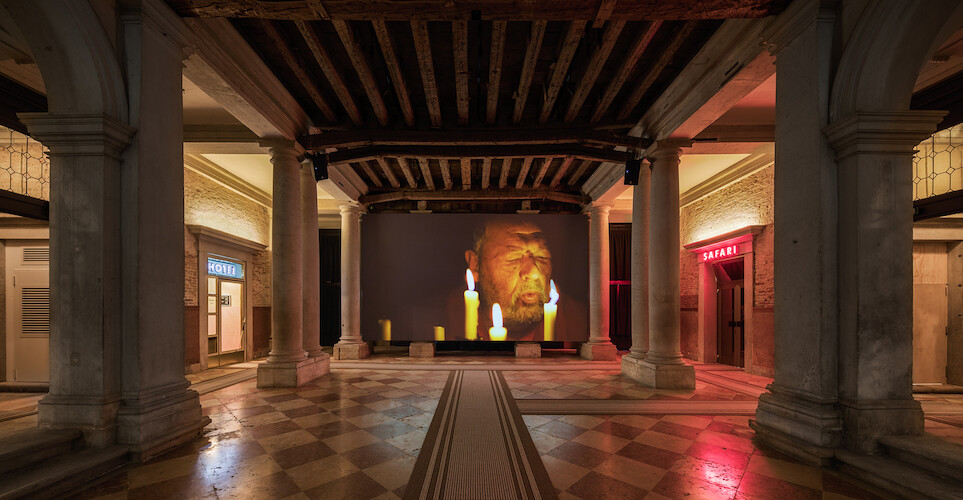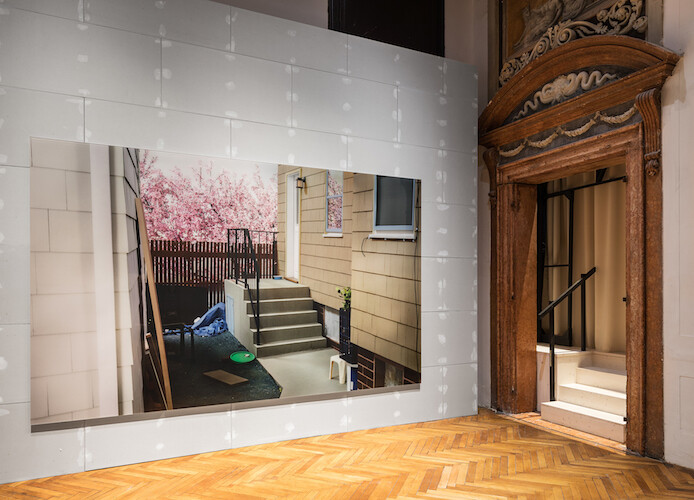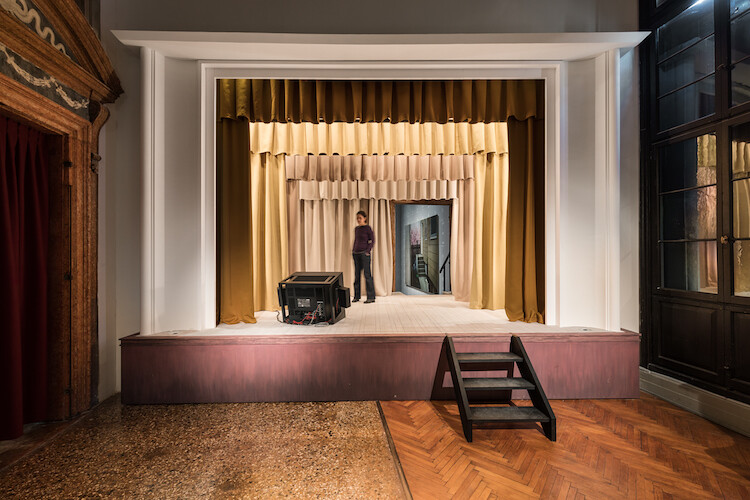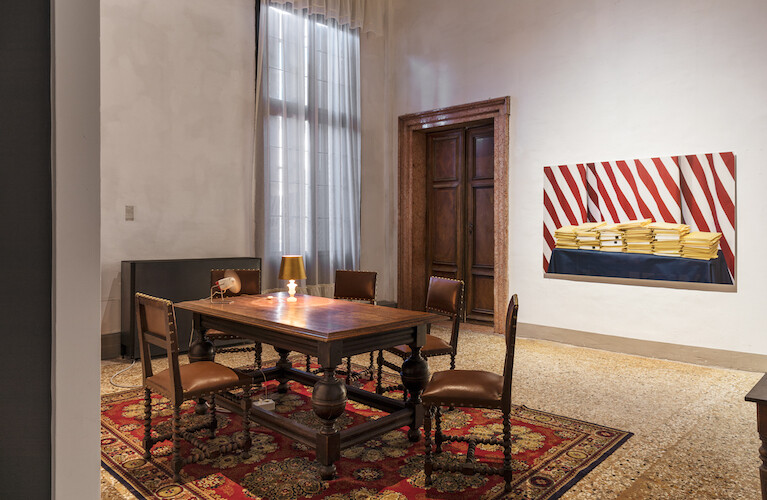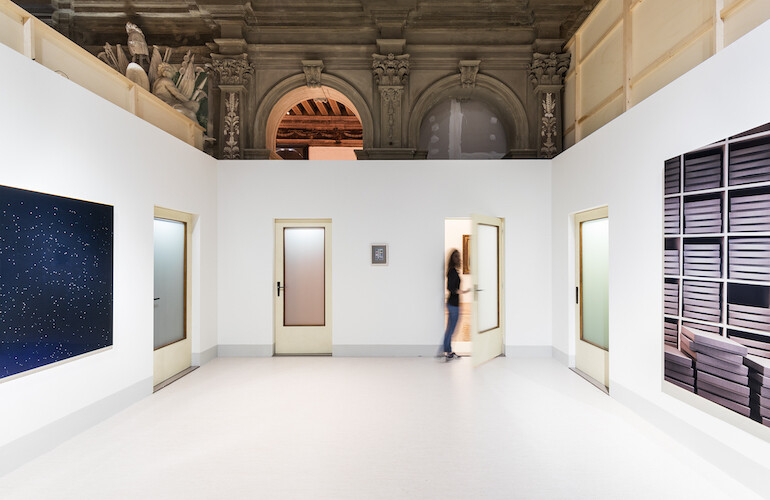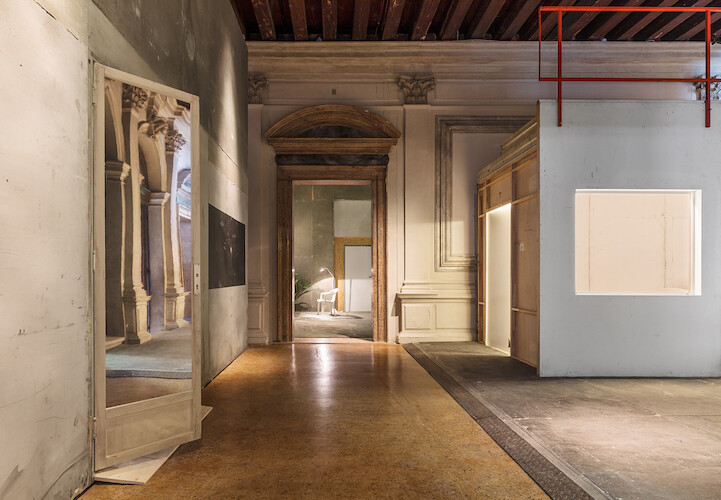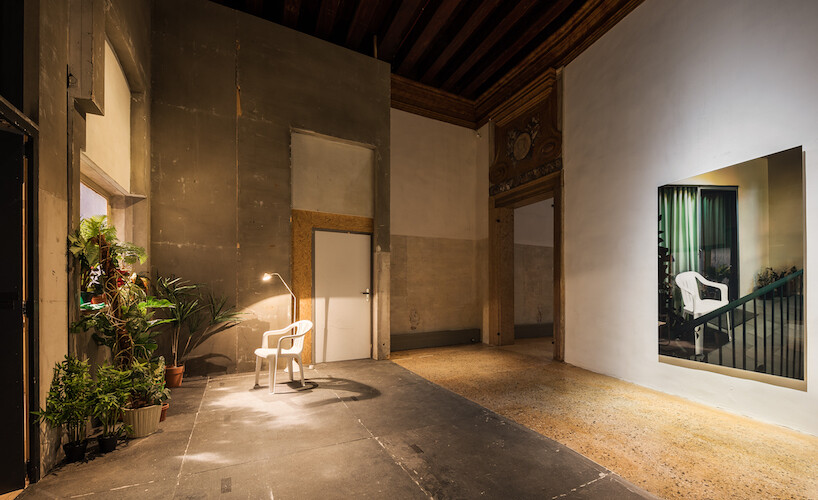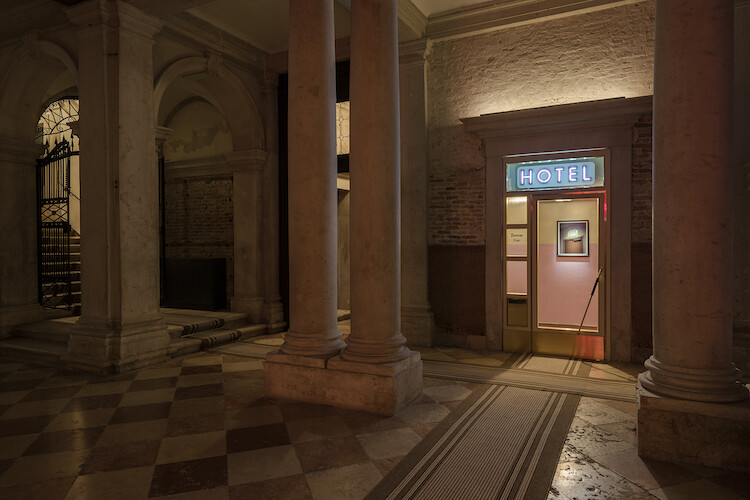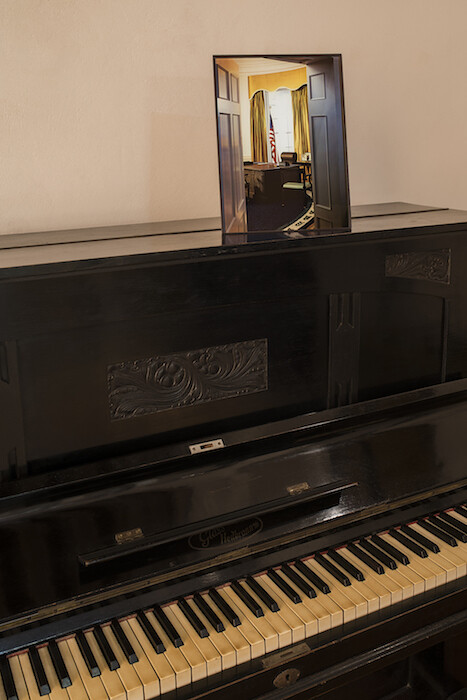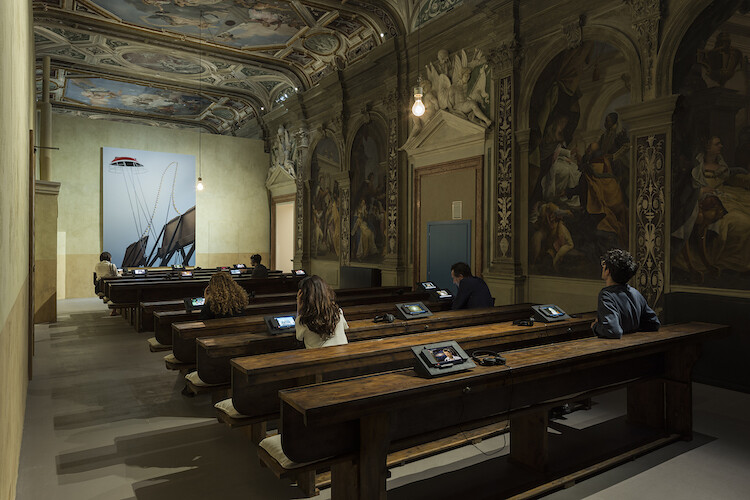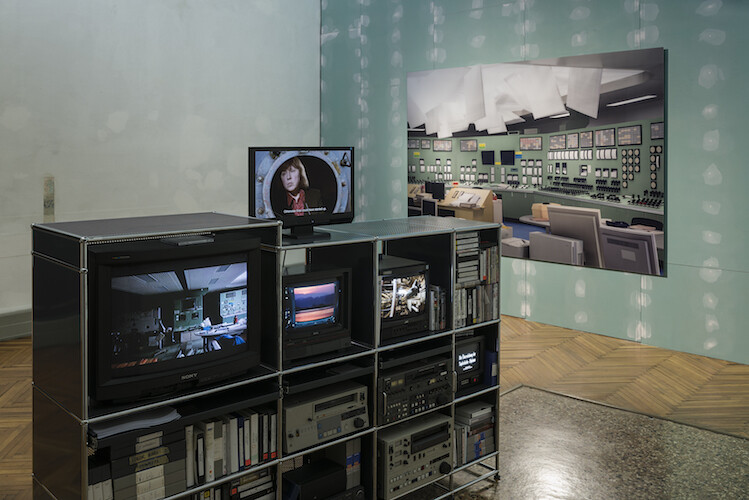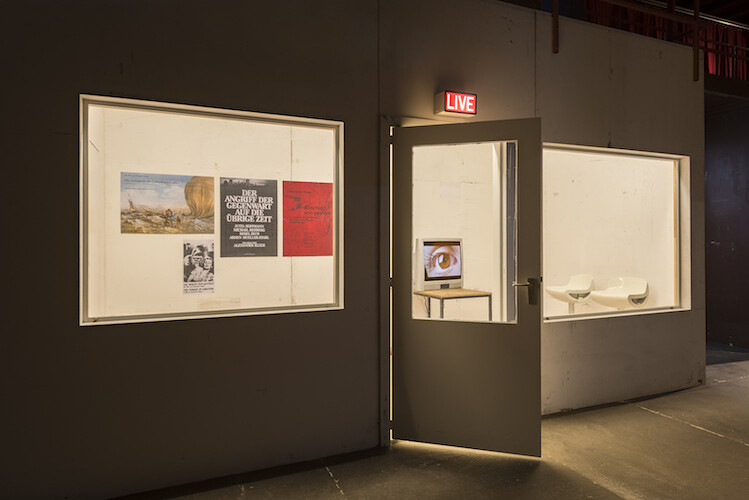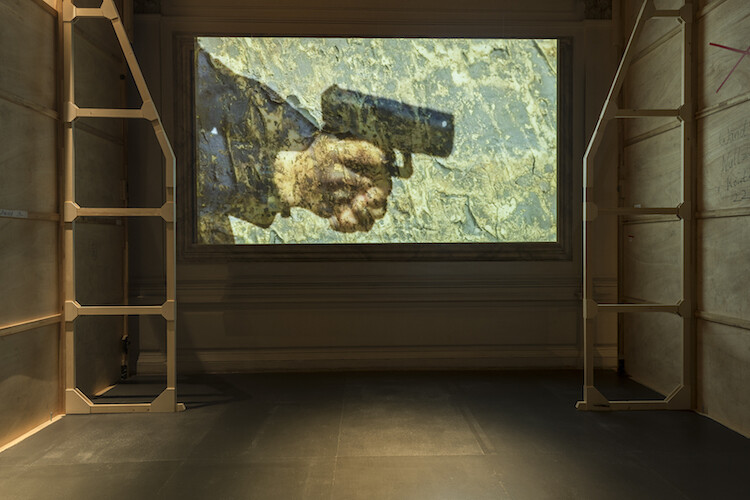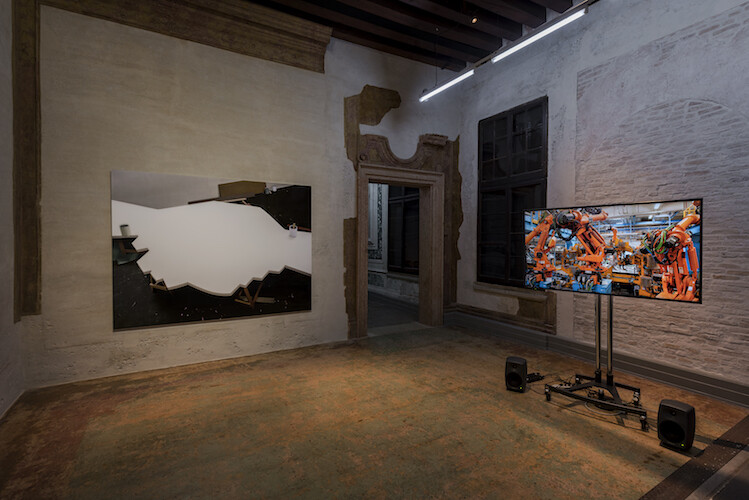THE BOAT
The metaphor of the ship of state is best known from Plato’s Republic. In the “collective exhibition concept” developed by Udo Kittelmann for the Fondazione Prada, this maritime trope of political community is evoked unmistakably yet only obliquely, mediated through the titular citation of Leonard Cohen’s devastating 1988 song “Everybody Knows.” Ancient foundations meet our contemporary crisis in a palimpsestic detour perfectly befitting this brilliant, bewildering, and highly intertextual exhibition. Across three floors, Kittelmann interweaves the work of three German artists, each preeminent in their respective field, each with a distinct interest in the politics of illusion and the textures of modern experience: photographer Thomas Demand, filmmaker Alexander Kluge, and scenographer Anna Viebrock. The result is less an experience of disparate practices, let alone single artworks, than it is an encounter with a holistic, albeit fragmentary, reflection on truth, falsity, and the public sphere in an age of “alternative facts.”
If the political community is a ship, this vessel is our quotidian domicile. Yet the ship is also a heterotopia—a space with its own time, its own rules. Inside Prada’s baroque palazzo—itself set apart from the tourist bustle—Viebrock has meticulously recreated an array of such “other spaces”: a courtroom, a cinema, a theater, a museum gallery, and a department store. All participate in an exhibitionary complex of power and display. Viebrock’s nested simulacra are not generic, but reference specific real-world sites and fictional mise-en-scènes, whether it is the ceiling of Hamburger Bahnhof or the sets of Christoph Marthaler’s recent production of Alban Berg’s Lulu (1937). With no detail spared, “The Boat is Leaking. The Captain Lied.” stages the architectural apparatuses of modern spectacle that shape our lives, holding them up for examination as it simultaneously indulges their pleasures and procedures. Within them, works by Demand and Kluge resonate with their surroundings to create an atmosphere of equal parts whimsy and foreboding, activating affect and intellect alike.
THE LEAK
Everywhere there are doors, each the start of its own narrative—doors from construction sites, power stations, padded doors, plywood doors, doors with frosted glass. On the ground floor, entrances to a bar and a hotel flank a large projection of Kluge’s The Soft Makeup of Lighting (2007), but they are locked, the interiors of leisure they promise non-existent. A story above, it is almost surprising when doors do open—but one never knows what waits on the other side.
This playfully theatrical use of thresholds allegorizes a larger tension between confinement and effluence found throughout the exhibition. The palazzo’s decor pokes through to puncture the perfection of the spaces-within-spaces; the practices of the three artists remain distinct and yet signify together. Angelo Morbelli’s paintings of an almshouse line the walls of the recreated museum space; a room glimpsed within them becomes, after a few steps, the environment one inhabits. A plastic lawn chair tumbles out of Demand’s Patio (2014) and into the gallery space. So too are the categories that habitually structure aesthetic experience evoked only to become permeable. The visitor enters a confounding world in which received distinctions—artist/curator, figure/ground, actual/virtual, truth/illusion—are thrown into jeopardy. Between the horror of the crisis of democracy and the creative freedom of the crisis of categories lies the ambivalence of the leak.
THE CAPTAIN(S)
An exhibition such as this might be expected to be the apotheosis of an increasingly troubling feature of contemporary art: the dominance of curator over artist. Yet it partakes of nothing of the sort, rather developing its proposals from correspondences between three figures who have long been in dialogue. Kluge’s established engagement in political-modernist filmmaking and television production appears across multiple supports (projection, monitor, iPad) in compilations of excerpts, rearticulating the interest in fragmentation found in earlier works such as Power of Emotions (1983). (It is, quite notably, only in the recreated cinema that his feature films are screened in full.) Even still, his incessant mining of the cultural past and belief in the utopian possibilities of alternative public spheres remain palpable. His admixtures of fiction and documentary chime with Demand, who troubles photography’s apparently testimonial vocation by creating almost-believable mock-ups of highly charged locations and events drawn from actuality—Leni Riefenstahl’s archives, Fukushima, the site of a child’s murder, a cruise ship adrift. Demand’s fastidious construction and interest in citation echo the principles of Viebrock’s scenography, which itself forms the bedrock of the exhibition.
Another captain: the current United States president. If hearing Cohen’s a cappella voice at the entrance were not enough to frame the exhibition as a commentary on the United States’ state of emergency, Demand’s Folders (2017) references the piles of documents—widely suspected to be blank paper—produced by Donald Trump as evidence of his divestiture from business interests prior to assuming office. A detail of Presidency (2010), reproduced at a scale uncharacteristically small for the artist, sits atop a piano. Here, Demand has recreated the Oval Office, but a close look reveals the photographs within the photograph to be nothing of the sort: the figures’ faces are mere blank fields.
THE LIE
A fear of appearances is enshrined at the heart of the Western philosophical tradition. Theater and illusion are frequently posited as antithetical to knowledge, which can only be produced by tearing down the veil. Demand, Kluge, and Viebrock complicate the enduring association of simulation with escapism and mystification, showing that artifice can provide an important means for approaching reality—even as spectacle and fabrication operate as forms of political currency that aim to obfuscate it. Unlike Trump’s presentation of empty folders, here fakery is not meant to fool the viewer but to denature perception and thought. Elsewhere in Venice, in “Viva Arte Viva,” a forgetful, neocolonial fetishization of authenticity problematically reigns. The multidisciplinary Brechtianism of “The Boat is Leaking. The Captain Lied.” offers a bracing rejoinder, insisting that the opening lines of Kluge’s Abscheid von Gestern [Yesterday Girl, 1966] remain true for our time: “What separates us from yesterday is not a rift but a changed position.”

